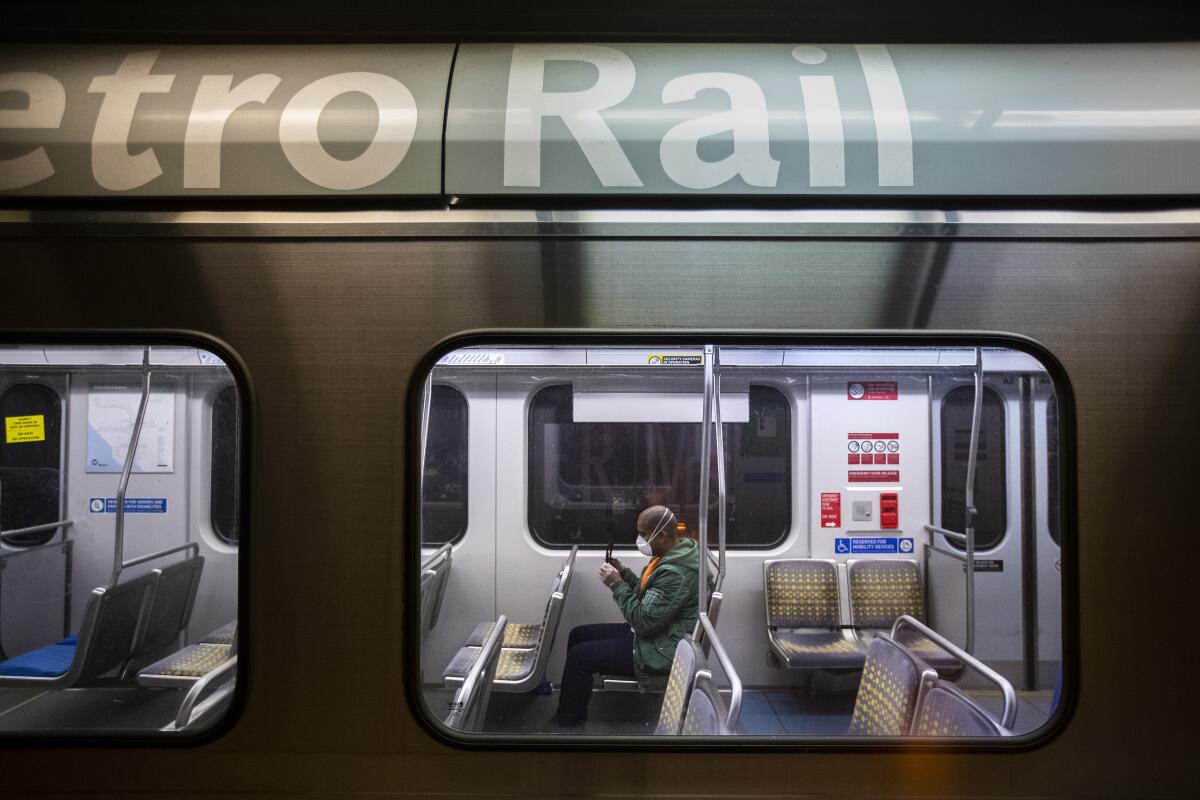L.A. Metro votes to create financial plan for offering free rides to students, low-income riders

- Share via
The Metropolitan Transportation Authority has decided it still needs a strong financial plan before greenlighting a pilot project that would allow students and low-income people to ride Metro trains and buses for free.
Metro’s directors unanimously voted Thursday to direct incoming Chief Executive Officer Stephanie Wiggins to develop a proposal to ensure the plan is financially sustainable. The project must satisfy several conditions, including assurance that funding for this pilot program will not financially affect other pending or already existing programs.
Although the board’s vote does not officially greenlight the free fare plan, the board expressed unwavering support to keep the idea alive.
“Since we’ve been talking about fareless initiative, I’ve supported it,” said Janice Hahn, an MTA board member and Los Angeles County supervisor. “But I’m clear that it really matters how we get there and how we implement it.”
Under the initial 23-month proposal, K-12 and community college students would have been able to take Metro rides for free beginning in August. Low-income riders, who make up nearly 70% of Metro’s ridership, could join in on the service in January 2022.
Those deadlines are now scrapped to give Wiggins flexibility as she steps into her new role. But Los Angeles Mayor Eric Garcetti, who chairs the Metro board, said he’d push to try to get the pilot plan running in time for when students return to campuses in the fall.
The pilot program is estimated to cost $250 million for Metro over the next two fiscal years. Fare revenue helps pay for a portion of the transit system and Metro receives additional funding through sales tax and state and federal grants. Metro officials identified state and federal grants, plus third-party partnerships and cost-sharing with school districts, to help fund the pilot plan.
“One-time funds scare me because by definition, they’re one-time funds,” said MTA board member and Glendale Councilman Ara Najarian. “How can you develop a sustainable initiative when each year you’ve gotta cross your fingers and go lobby Washington or Sacramento for funding that would keep this up?”
But Garcetti said officials would be “working our tails off to not only identify that funding but to make the case and to hopefully address also the coalition.”
Metro offers discount rates to students, seniors, low-income populations and people with disabilities, but the proposal under discussion is a way to gauge whether Metro could be fully free in the future.
Metro will continue with its current fare collection policy until the board adopts a formal plan for the pilot, according to Los Angeles County Supervisor and MTA board member Holly J. Mitchell.
Outgoing Metro CEO Phillip A. Washington, who attended his last meeting Thursday, floated the idea years ago when he suggested congestion pricing, which would have charged people more to drive by converting carpool lanes to toll lanes, taxing drivers based on the number of miles they travel or charging a fee to enter certain areas of town.
Riders were already leaving L.A.’s bus network when Washington arrived in 2015, and the decline continued during his tenure. The pandemic further exacerbated the decline.
With the majority of the MTA’s ridership Latino and Black, many students and organizations asked how eliminating fees would help them. One college student described the hardship of having to pay $1.75 every day.
Los Angeles Community College District Chancellor Francisco C. Rodriguez said in a statement that this kind of program could “be a real difference maker between going to college or not, and removes one major obstacle from the paths of students in accessing higher education.”
“Everyone is on board with the mission of a fareless system at Metro,” said Eli Lipmen, director of programming and development for the organization Move L.A. “But there are varying degrees of confidence that the resources are available.... Success really depends on whether Metro can find willing partners in Sacramento or D.C.”
More to Read
Sign up for Essential California
The most important California stories and recommendations in your inbox every morning.
You may occasionally receive promotional content from the Los Angeles Times.











